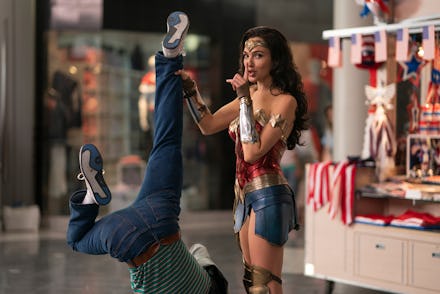How many more superhero movies can we take?

Wonder Woman 1984’s chief villain, Pedro Pascal’s Max Lord — in a 155-minute film, with two openings and extended rom-com scenes — is aptly focused on hammy excess and too-good-to-be-true promises. More power, more respect, more influence. "What is there to wish for but more?" one character says to him. Despite its Christmas Day debut as a zanier (if more widely derided film) than its predecessor, Lord's getting his wish. Warner Bros. confirmed over the weekend that it’s fast-tracking a third Wonder Woman film, with director Patty Jenkins and Gal Gadot set to return. And that’s just part of it.
It’s no secret that the Marvel-Disney game plan is to continually push the goalposts for superhero saturation — multiple films per year, with corresponding TV spin-offs over on Disney+, tapping further into the more obscure heroes. In an interview with the New York Times, DC Films president Walter Hamada outlines his plans to follow the same playbook and then some. This means so many more blockbuster DC films — “up to four a year, starting in 2022,” with an additional two from marginal characters headed straight to HBO Max. That's as many as six films annually, with a bounty of spin-off Max TV series for upcoming films like The Batman and The Suicide Squad.
While Marvel's upcoming Spider-Man and Doctor Strange films are openly toying with the multiverse, casting old stars from the Tobey Maguire and Andrew Garfield series for Tom Holland’s next outing, DC is taking this a bit further. Hamada confirms to the Times that we’ll be dealing with two Earths — one with Gadot’s Wonder Woman, and the cast of Justice League, and another with Robert Pattinson’s The Batman. As previously reported, the upcoming Flash movie will bring the Batmen together — Michael Keaton from the Tim Burton flicks, Ben Affleck from the brooding Snyderverse.
Hard as it is to imagine this coexisting successfully with WarnerMedia’s plan to shuttle huge blockbusters on HBO Max, there’s plenty of reason for skepticism in the straight-to-streaming mode working long-term. First, there’s Jenkins — an open critic of Warner’s evasion of theaters — coming back for the third installment. It’s hard to imagine her doing that without assurance of her film hitting theaters exclusively. Then, you have Warner doing that Netflix-y thing of avoiding explicit streaming tallies with the Times:
“WarnerMedia provided only vague information about the sequel’s performance on HBO Max, saying in a news release that “millions” of subscribers watched it on Friday. Andy Forssell, WarnerMedia’s direct-to-consumer general manager, said the movie “exceeded our expectations across all of our key viewing and subscriber metrics.”
Things are going swimmingly, if you just take their word for it. Despite Wonder Woman 1984’s plummeting Tomatometer, and the issue of dunkable clips and screengrabs making their way around the web on day one — it’s all about the subscribers. Much like Tenet’s forced release into theaters during a pandemic summer, it’s hard to extrapolate much of a wider industry temp-check from a blockbuster film hitting streaming on a pandemic Christmas Day, when everyone’s largely home with nothing better to do. We’ll see how it plays, say, on the first weekend in May.
Hamada, for his part, is confident in his audience’s highbrow tendencies to... understand multiple actors playing different superheroes. “I don’t think anyone else has ever attempted this,” Mr. Hamada said. “But audiences are sophisticated enough to understand it. If we make good movies, they will go with it.”
This all might sound like frantic catch-up to the superhero behemoth operating just outside the frame, but it ultimately ensures that we’re stuck with the superhero-movie arms race for at least another decade to come.